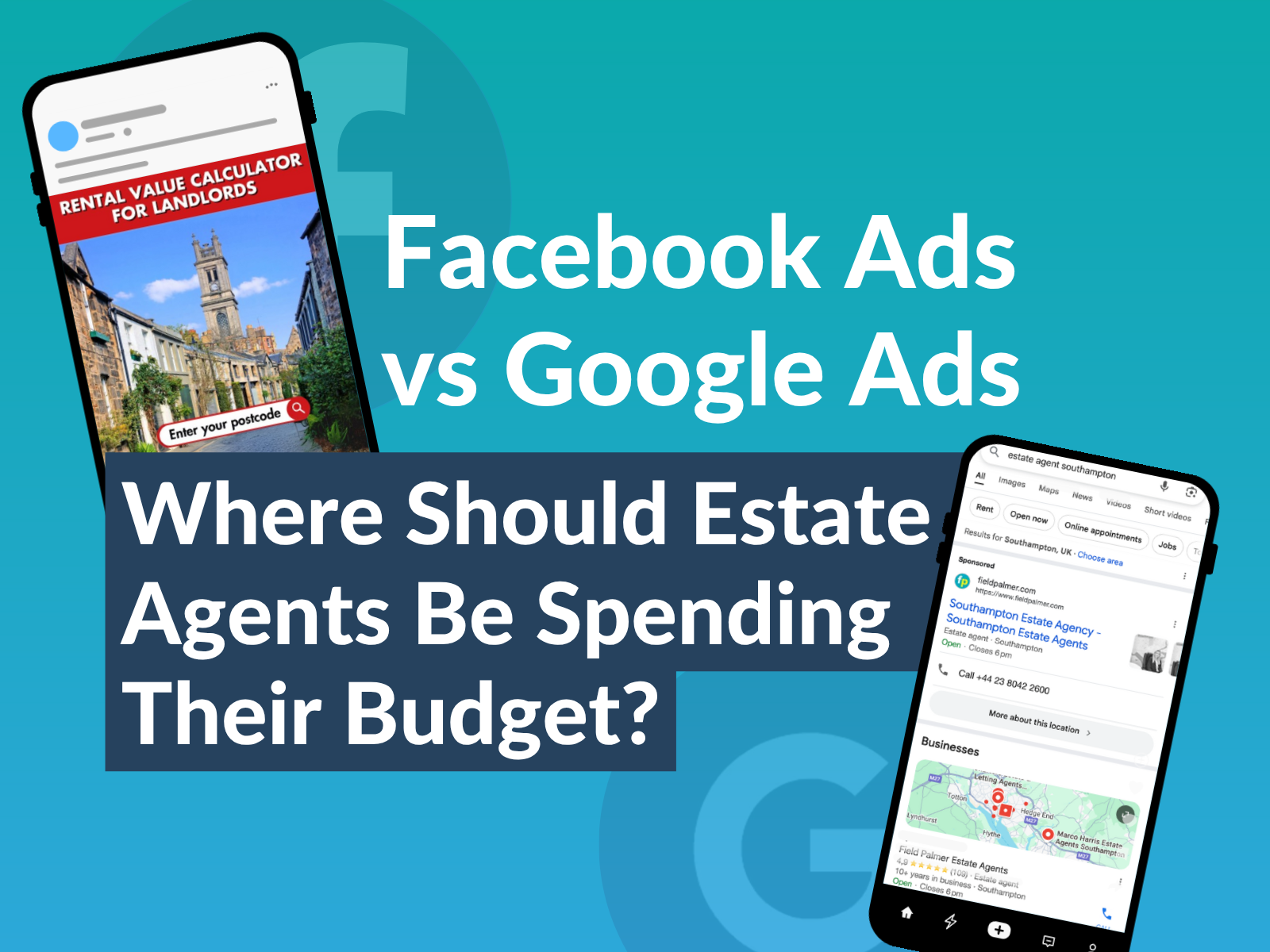Blog
All the latest from The ValPal Network

Facebook Ads vs Google Ads: Where Should Estate Agents Be Spending Their Budget?
by Ashleigh Loock
When it comes to digital advertising for estate agents in the UK, two major platforms tend to dominate the conversation: Facebook Ads and Google Ads. Both offer powerful targeting capabilities, wide reach, and measurable results, but they serve very different purposes.
If you're wondering which is best for your agency, the answer isn’t always straightforward. It depends on your goals, your audience, and where your leads are in their sales or lettings journey.
Here’s what estate agents need to know.
The Core Difference: Intent
The biggest difference between Facebook Ads and Google Ads comes down to one word: intent.
Google Ads are intent-based. You’re targeting people who are actively searching for something – for example, “estate agents in Leeds”, “sell my house fast in Bristol”, or “free online property valuation”.
These are hot leads. They already know they need a service like yours – they’re just deciding who to go with.
In contrast, Facebook Ads are interruption-based. Your ad appears in someone’s feed while they’re scrolling through posts, watching videos, or catching up on local news. They’re not necessarily looking to sell or let their home – but you can still grab their attention if your message resonates.
These are typically colder leads. They might not have even considered moving at all until they saw your ad. Facebook is a predictive platform that looks at individual users’ web activity to determine who to best target your ads with. This means Facebook can predict people who might be looking to move home in 6 months’ time based on their online behaviour. The great news here is that you can get in front of these people long before your competition and make a great first impression.
Facebook Ads: Reaching Homeowners Early in the Journey
Facebook (and Instagram) are brilliant for building awareness. They allow you to reach people based on location, demographics, interests, behaviours – and even major life events (like recently getting engaged or moving home).
This makes Facebook Ads a strong choice if you’re looking to:
- Get your agency’s name out there
- Stay front of mind with local homeowners and landlords
- Promote blog content, guides, or tools (like instant online valuations)
- Re-target past website visitors or lapsed leads
But here’s the key: most people won’t convert straight away. You’re planting seeds – starting conversations that may take weeks or months to turn into a valuation request.
That doesn’t mean Facebook Ads aren’t worth it – but it does mean they need the right follow-up. A strong lead nurture strategy (think email drip campaigns, remarketing, and consistent social media content) is essential. To give you a better idea of what to expect, in our experience and backed by data from TwentyCI, one in five (around 20%) of Facebook Ad leads instruct an agent.
Pro Tip: With Facebook regularly updating its ad tools and targeting options, staying on top of the latest changes can be a challenge. Having some professional guidance truly can go a long way in getting the most out of your campaigns.
Google Ads: Tapping Into Active Intent
Google Ads, on the other hand, typically capture people at the point when they’re ready to act.
If someone’s typing “how much is my house worth” into Google, chances are they’re seriously considering a move. This is your opportunity to put your brand in front of them before they contact a competitor.
Google Ads are ideal for:
- Generating instant valuation leads
- Driving phone calls and enquiries
- Targeting hyper-specific search terms
- Competing for high-value sellers and landlords
The downside? It can be more expensive. Popular search terms (especially in busy towns and cities) can cost a premium per click – and you’ll need a well-optimised landing page to convert that traffic into leads.
Pro Tip: Google is a platform where the setup really matters, so many agents find it helpful to get a bit of expert support to make sure everything’s running smoothly from the start. By focusing your ad spend on low cost, high converting keywords, you can get great results for a reasonable daily budget of just £10 per day. So Google Ads don’t need to break the bank!
The Next Big Consideration: Budget
Another important factor that often sways the decision between Facebook Ads and Google Ads is budget.
In general, Facebook Ads tend to be more cost-effective, especially when you're focused on brand awareness or retargeting. You can start small and still reach a decent local audience.
We typically recommend:
- £5 per day for Facebook Sales lead campaigns
- £7 per day for Facebook Lettings lead campaigns
- As little as £1-2 per day for brand awareness or retargeting
Google Ads, on the other hand, usually require a bit more upfront spend to compete in the search results – especially in busy areas where keywords can be highly competitive.
For Google, we suggest:
- A minimum of £10 per day per campaign for both Sales and Lettings lead generation
It’s important to remember that a higher budget doesn’t always mean better results – but spreading your spend too thin can limit performance on both platforms.
So, Which One Is Better?
Here’s the truth: neither is better across the board – they just do different jobs.
Use Facebook Ads when you want to:
- Build brand awareness locally
- Capture leads from homeowners/landlords who might be earlier in their property journey
- Re-engage previous website visitors
- Promote educational or trust-building content
- Generate a higher volume of colder leads at a lower cost
Use Google Ads when you want to:
- Capture higher-intent sellers and landlords
- Get quick, conversion-focused results
- Show up for key search phrases in your area
- Increase website visibility instantly
And in many cases, the best strategy is a combination of both. Use Facebook Ads to build awareness and fill the top of your funnel, then use Google Ads to convert those who are ready to take action now.
Final Thought
If you're only running ads on one platform and ignoring the other, you might be leaving leads (and instructions) on the table.
Estate agency marketing today is about showing up in the right place at the right time – and both Facebook and Google play a valuable role in that journey.
The key is knowing how to use each one strategically.
Would you like help reviewing your current ad setup? Or need guidance on how to make both platforms work together? Send us an email at team@valpal.co.uk – we’re ready to help you get started.

Want to hear more?
Leave your name and contact details with us and we'll get back to you shortly!
Alternatively, you can contact us directly.
